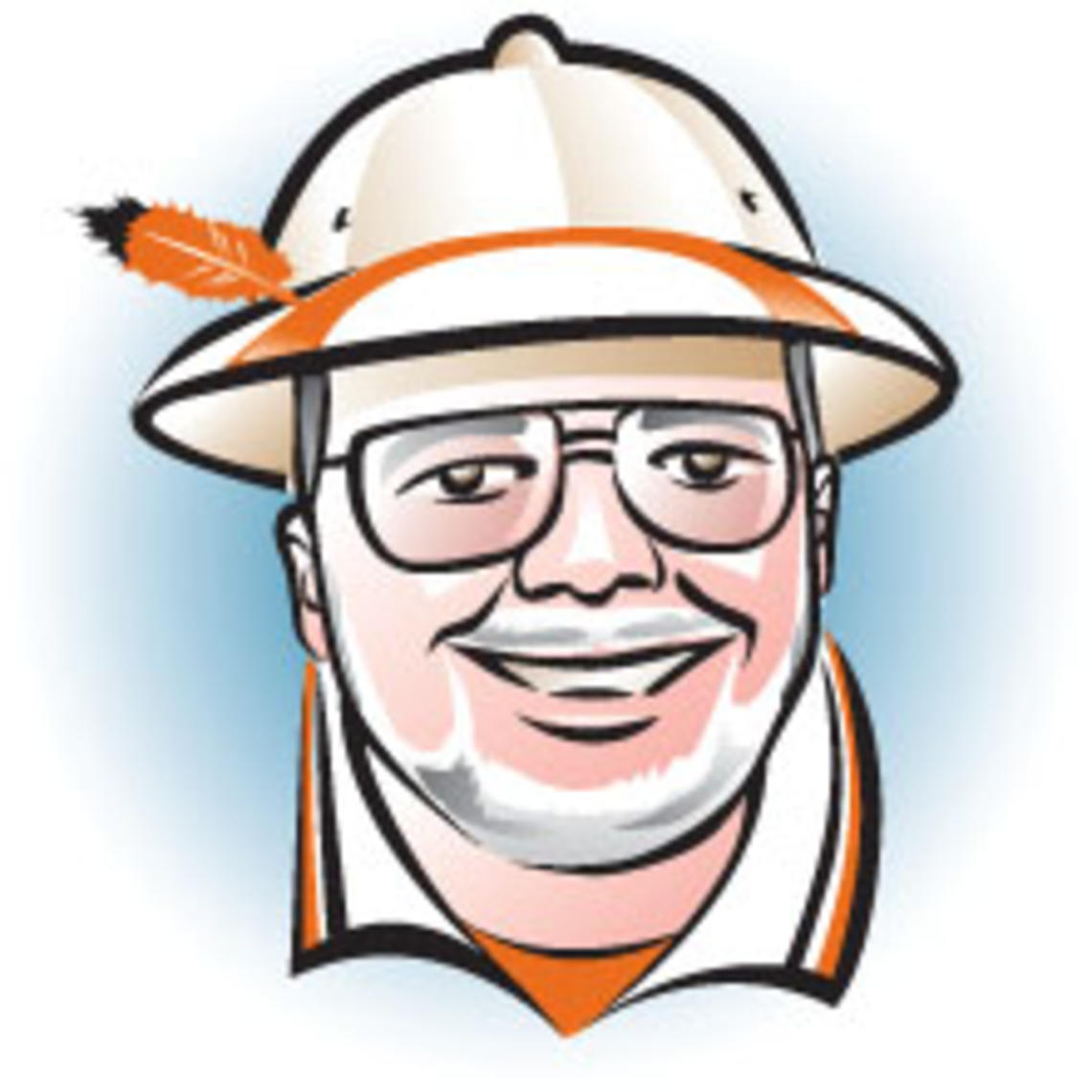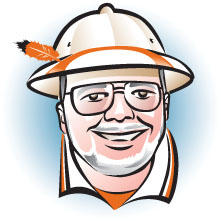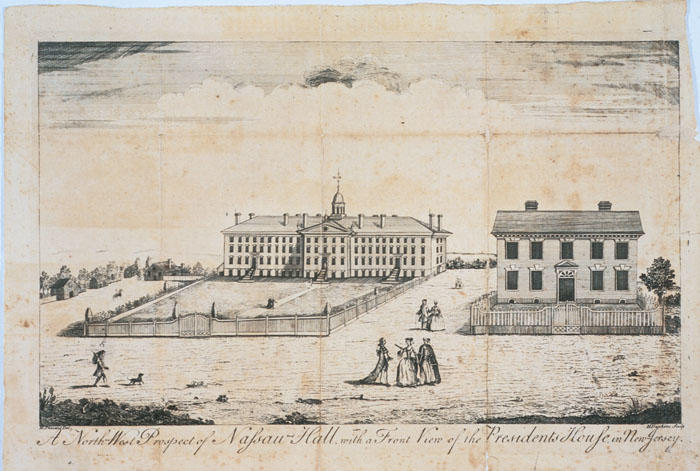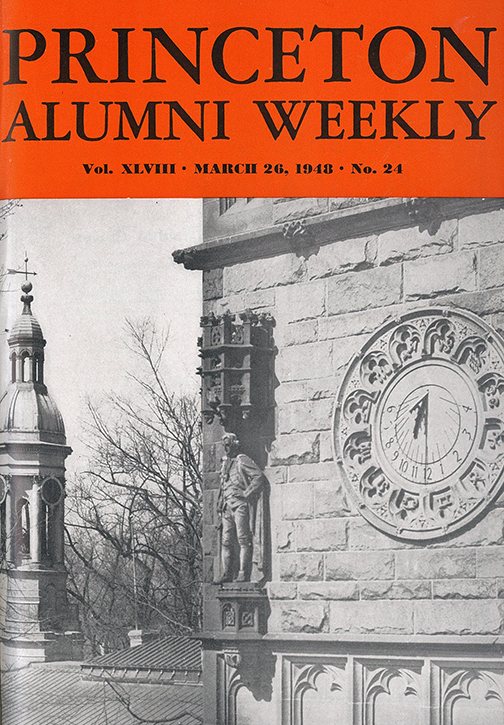
He always has an alibi, and one or two to spare;
At whatever time the deed took place - Macavity WASN’T THERE!
— T.S. Eliot, “Old Possum’s Book of Practical Cats”
Buried perversely somewhere in my verbal truce understanding with the august editors of this Fine Family Publication is the obligation to refer periodically to the very brave effort they made a few years back in choosing the 25 Most Influential Princetonians ever in a wonderful double issue, packed with more Princeton history than you can pick up in a month of walking the campus, which is saying something. And despite a decorous wimp-out as the final gun sounded (a 25th-place tie between Don Rumsfeld ’54 and Ralph Nader ’55, those old drinking buddies), it remains a ranking deep in thoughtfulness and nuance, covering the ground from No. 7 Benjamin Rush 1760, America’s first psychiatrist (a big favorite in any newsroom, for sure) to No. 13 Wendy Kopp ’89 and her Teach for America thesis that was famously derided by the magnificent professor Marvin Bressler, who afterward made something of a career telling the story on himself.
Oliver Ellsworth 1766 is not on the list.
Oh, there are lawyers (although Princeton’s fortuitous lack of a law school serves the dual function of keeping the numbers down and minimizing lawsuits from the excluded), but the power and potential of the U.S. Constitution is represented by Virginia’s No. 1 Jemmy Madison 1771, No. 16 Nicholas Katzenbach ’43, and Nader. There are patriots, too, including Rush, Madison, and No. 22 Philip Freneau 1771 – Madison’s poet roommate – to salute the University’s import in the founding of the country. There are internationalists like No. 3 Woodrow Wilson 1879, No. 6 George Kennan ’25, and No. 10 John Foster Dulles 1908 to show Princeton’s impact in an ever-morphing world.
Despite his expertise in all these categories and repeated presence at crucial junctures in American and world history, Ellsworth is not on the short list; he’s the perfect candidate for the Macavity (Eliot’s Mystery Cat, “The Hidden Paw”) of the 18th century.
Imagine someone who spent six arduous years in the Continental Congress, but didn’t sign the Declaration of Independence. Or someone who led large elements of the 1787 U.S. Constitutional Convention (like Madison), and constructed the crucial Connecticut Compromise to rescue the entire enterprise – but again wasn’t around to sign. Or someone who negotiated a difficult diplomatic agreement with the wildly unpredictable French Napoleanic government in 1800 to avert a virtual state of war (and destroyed his health and almost lost his life on the voyage to Paris), opening the path to the Louisiana Purchase – but wasn’t in on the land deal itself and so returned, seriously ill, to Hartford in obscurity instead of New Orleans in glory. Or a lawyer who endured the frustration of legal dishevelment under the Articles of Confederation, then finally was able to design, as President George Washington’s majority leader in the very first session of the United States Senate, the clear pre-eminence and structure of the federal courts, and then became the chief justice of the Supreme Court of the new, promising United States under the Constitution – but left (because of his ruined health from the Paris trip) and so was absent as his successor became legendary for the concept of judicial review and as the molder of the judicial branch as an equal third of the government. Between 1777 and 1800, Ellsworth was all of these. Thanks to his French voyage, seven years later he was dead at age 62; the legendary John Marshall, who sent him there as Secretary of State at the time, not only got credit for the treaty, but succeeded Ellsworth when he was too infirm to resume his seat as chief justice, and so became the historic giant we know today.
Should you decide then, in the can-do spirit here at the History Corner, to ask our friends at Google about Ellsworth, they will come back with 116,000 references. Should you instead inquire as to his contemporary, Aaron Burr Jr. 1772 – whose achievements and legacy are, shall we say, less consistent (that pesky treason trial, shooting people, and so forth) – you will find 905,000. Macavity has 556,000.
Thomas Jefferson Wertenbaker, admired professor of Colonial history for 37 years at Princeton and president of the American Historical Association, wrote, under commission for Princeton’s bicentennial, the definitive history of the College’s first 150 years, from 1746-1896. A paradigm of its type, it’s complex and nuanced, with an uncanny ability to imply, state, or browbeat its points into a rich portrait of an epoch and ethos as well as a place and an institution. The pivotal third chapter, entitled “A School for Statesmen,” lays out the rich evidence for Princeton as the dogmatic, philosophical, and personal driver of the American Revolution in the last half of the 18th century, and spends 37 pages in rich detail supporting that thesis. Oliver Ellsworth gets 18 words, four of them “Oliver” or “Ellsworth.” The sprightly and endlessly entertaining and evocative Princeton: the First 250 Years commissioned for the University’s celebration in 1996 from journalist Don Oberdorfer ’52 and photo-illustrator J.T. Miller ’70 invokes flavor right down to the Café Princeton in Burkina Faso; in 269 8.5”x12” pages, Ellsworth’s name does not appear.
The Oliver Ellsworth Collection at the University Library contains seven items. There are, of course, hundreds upon hundreds of documents on Aaron Burr. Ellsworth’s alumni file (essentially his press clippings) includes precisely one addition in the last 38 years – notice of an exhibition at his home in Connecticut – while Burr’s has dozens, highlighted by a five-page cover story in Your Favorite Periodical (Dec. 1, 1983).
But Macavity’s not there!
But in all these astounding, confounding adventures, which resemble the tale of a Forrest Gump or Leonard Zelig with a brain and/or law degree, you haven’t heard the best one yet. The reason we’re considering Oliver “Macavity” Ellsworth today is the 250th anniversary of possibly his most confounding moment – which as you can see is really saying something. In the Fall of 1764 Oliver Ellsworth, lifelong Congregationalist (they’re the ones the Princeton New Lights were revolting against) and resident of Connecticut, transferred from Yale to Princeton after his second year. Now, the College of New Jersey was becoming well-regarded, but it was tiny and had resided in Princeton for only eight years, and with its presidents dying frequently had only begun to get serious national traction with the ascendance of Samuel Finley just three years before. There being no concrete record at Yale of anything weird beyond some Ellsworth merrymaking (to the tune of a few shillings in fines) and a grumpy old president past his prime – Rev. Thomas Clap would be forced out, in part by student petition, in 1766 – the transfer, a seismic decision in its day, still bears an aura of mystery.
We know two things for sure. First, North Carolinian Waightstill Avery 1766 – who eventually would draft the state constitution there and serve as its first attorney general – transferred with Ellsworth, implying some philosophical as well as behavioral motivation. Second, Ellsworth clearly loved the very popular political give-and-take that was ubiquitous at Princeton in the era of the Stamp Act, such that he was one of the students corralled by alumnus William Paterson 1763 to form in 1765 the Well Meaning Club, a literary and debating group (quickly opposed by the Plain Dealing Club, one of whose principal purposes was to “outnumber the Well Meaning”). Suppressed by the faculty after this competition became obnoxious in 1769, they quickly reformed, this time as the Cliosophic and American Whig societies. The country’s oldest such organizations, they merged in 1928 and continue their lively debating as Whig-Clio today. The Well Meaning founders, in addition to Paterson, who signed the Declaration of Independence, also included Luther Martin 1766, who sat at the Constitutional Convention with Ellsworth, and Tapping Reeve 1763, founder of America’s first law school. These were seeds of the Revolution even before John Witherspoon entered the scene and fanned the flames big-time in 1768.
But in 1766, Ellsworth graduated Phi Beta Kappa, and vanished whence he came. In view of his remarkable future activities in the service of Connecticut and the country, whatever drove him to slog the 200 miles and five ferry crossings to college for those two years must have been worth the bother, and the lessons of Finley, Paterson, and his fellows certainly stood him in good stead in his legislative, legal, and diplomatic affairs to follow.
To our knowledge, Ellsworth was in Princeton twice again, in 1783 with the Congress as it said farewell to George Washington as commander (and avoided his troops, who were in Philadelphia and wished to be paid), and in 1790 when he received an honorary Doctor of Laws at Commencement, a rarity for a layman in those days, and in retrospect perhaps his greatest honor. At least, if he was destined to be forgotten in our time, Princeton treated him nicely in his own. There’s even a statue of him on campus, believe it or not, on East Pyne overlooking Cannon Green, but that of President James McCosh opposite is much better known. Of course.
Ellsworth, having returned to his beloved Connecticut a shell of himself in 1800, and none too pleased with the ascendance of Jefferson and his Democratic-Republicans, served on a few local committees, watched as an improved state constitution was enacted, then accepted the new position of state chief justice – only to resign immediately before taking the bench in order to die in peace; another near miss in a lifetime of brushes with greatness. In the Encyclopaedia Britannica, his biography was written by John F. Kennedy (the only entry by the late president), who notes that “his career included few acts of genius.” Ellsworth’s modern-day biographer, William R. Casto, adds for good riddance that “he lacked the intellectual brilliance of some of his contemporaries.”
Having mulled over all this for a while, I’ve decided that life is like a box of chocolates.













No responses yet